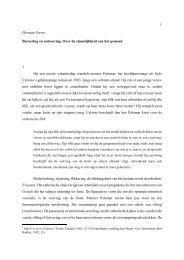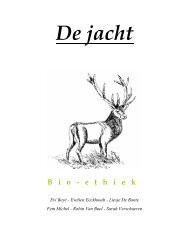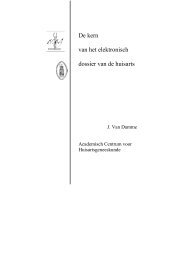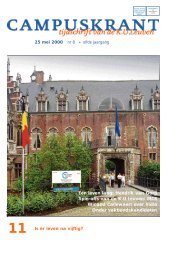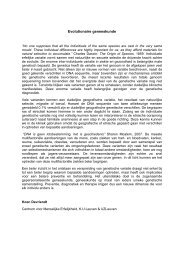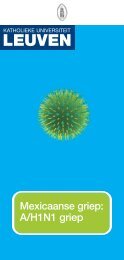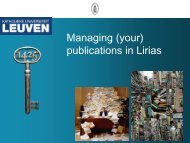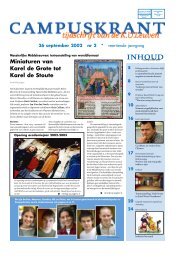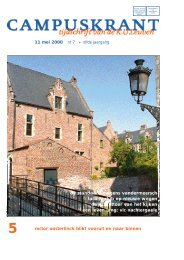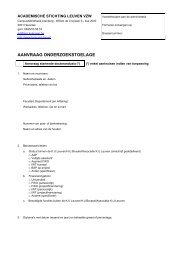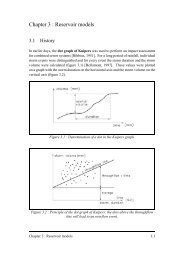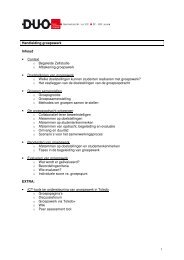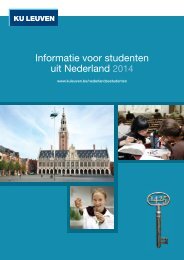Brochure Internationalisation at KU Leuven
Brochure Internationalisation at KU Leuven
Brochure Internationalisation at KU Leuven
You also want an ePaper? Increase the reach of your titles
YUMPU automatically turns print PDFs into web optimized ePapers that Google loves.
<strong>Intern<strong>at</strong>ionalis<strong>at</strong>ion</strong><br />
<strong>at</strong> <strong>KU</strong> <strong>Leuven</strong><br />
Click here
Table of contents<br />
Click here<br />
<strong>Intern<strong>at</strong>ionalis<strong>at</strong>ion</strong> <strong>at</strong> <strong>KU</strong> <strong>Leuven</strong> 3<br />
Str<strong>at</strong>egy for <strong>Intern<strong>at</strong>ionalis<strong>at</strong>ion</strong> 4<br />
New Governance Structure 6<br />
The <strong>Leuven</strong> EDGE: <strong>Leuven</strong>’s Educ<strong>at</strong>ion and Research G<strong>at</strong>eway to Europe 8<br />
Research for Development 10<br />
Academic Diplomacy, Branding and Political Impact 12<br />
<strong>Intern<strong>at</strong>ionalis<strong>at</strong>ion</strong>@Home 14<br />
Networking as a Str<strong>at</strong>egy 15<br />
Useful Weblinks 16<br />
Exit
3<br />
<strong>Intern<strong>at</strong>ionalis<strong>at</strong>ion</strong><br />
<strong>at</strong> <strong>KU</strong> <strong>Leuven</strong><br />
We live in a knowledge-driven world. As a leading<br />
European university, <strong>KU</strong> <strong>Leuven</strong> is dedic<strong>at</strong>ed to<br />
strengthening its position in the global knowledge<br />
community. The office of Vice Rector for Intern<strong>at</strong>ional<br />
Policy was added to the university’s executive team,<br />
reflecting the increasing importance of intern<strong>at</strong>ionalis<strong>at</strong>ion<br />
in the university’s governance.<br />
This brochure provides an overview of the many initi<strong>at</strong>ives,<br />
partnerships and milestone events th<strong>at</strong> have taken place<br />
in the area of intern<strong>at</strong>ional policy <strong>at</strong> <strong>KU</strong> <strong>Leuven</strong>.<br />
Table of contents
4 INTERNATIONALISATION AT <strong>KU</strong> LEUVEN<br />
Str<strong>at</strong>egy for <strong>Intern<strong>at</strong>ionalis<strong>at</strong>ion</strong><br />
<strong>KU</strong> <strong>Leuven</strong> is a comprehensive, research-driven university with<br />
a strong intern<strong>at</strong>ional orient<strong>at</strong>ion. It is Belgium’s largest and<br />
highest-ranked university and welcomes more than 40,000 students<br />
(of which 18% are intern<strong>at</strong>ional), 2,263 senior and junior academic<br />
staff and 4,586 PhD students and postdocs. In total, the university<br />
employs nearly 10,000 people. Its network of research hospitals<br />
– one of the largest of its kind in Europe – employs an additional<br />
8,775 employees.<br />
Founded in 1425, <strong>KU</strong> <strong>Leuven</strong> is one of the oldest universities<br />
in Europe. Its 16 faculties and 30 research departments are<br />
organised into three overarching ‘groups’: the Humanities and<br />
Social Sciences Group; the Science, Engineering and Technology<br />
Group; and the Biomedical Sciences Group. <strong>KU</strong> <strong>Leuven</strong> offers<br />
high-quality educ<strong>at</strong>ion, top-level research facilities and cuttingedge<br />
innov<strong>at</strong>ion in a truly intern<strong>at</strong>ional environment.<br />
The city of <strong>Leuven</strong> is centrally loc<strong>at</strong>ed in the heart of Europe,<br />
25 kilometres east of Brussels. Brussels is simultaneously the<br />
capital of Flanders, Belgium and Europe and is home to countless<br />
intern<strong>at</strong>ional headquarters. As such, <strong>KU</strong> <strong>Leuven</strong> is a hub for all kinds<br />
of collabor<strong>at</strong>ive activities – academic, research-based, commercial,<br />
industrial, diplom<strong>at</strong>ic, cultural – involving a wide array of actors in<br />
and around Brussels.<br />
In the last decade, the total number of intern<strong>at</strong>ional students<br />
enrolled <strong>at</strong> <strong>KU</strong> <strong>Leuven</strong> has more than doubled from 3,600<br />
in 2001 to 7,400 in 2012. About 2,000 of these students are<br />
degree-seekers. Students from the Netherlands comprise<br />
the largest group of intern<strong>at</strong>ional students from within Europe<br />
(+/- 1,500), while students from China comprise the largest group<br />
from outside Europe (± 600). The university welcomes around<br />
850 students annually within the framework of the European<br />
Commission’s Erasmus student mobility programme, and<br />
maintains more than 1,100 bil<strong>at</strong>eral Erasmus contracts with<br />
more than 400 universities across Europe. About 40% of all<br />
PhD students and postdocs come from abroad. Each year,<br />
university researchers carry out 11,000 missions abroad.<br />
<strong>KU</strong> <strong>Leuven</strong> is keenly aware of the increasing need to develop<br />
and implement an intern<strong>at</strong>ional str<strong>at</strong>egy th<strong>at</strong> will guide it through<br />
the many challenges of a globalising world. While research has<br />
intern<strong>at</strong>ionalised in the last decennia, much remains to be done<br />
to intern<strong>at</strong>ionalise our university’s educ<strong>at</strong>ional mission. Wh<strong>at</strong> form<br />
should our intern<strong>at</strong>ional educ<strong>at</strong>ional offerings take? Wh<strong>at</strong> kind<br />
of students do we want to <strong>at</strong>tract, and from where? How do we<br />
best prepare our students for a globalised labour market?<br />
Wh<strong>at</strong> intern<strong>at</strong>ional networks best suit our strengths and goals?<br />
These are some of the issues th<strong>at</strong> are covered by the university’s<br />
intern<strong>at</strong>ional policy. Currently, this policy takes the form of a<br />
Str<strong>at</strong>egic Plan for <strong>Intern<strong>at</strong>ionalis<strong>at</strong>ion</strong>, which was approved by<br />
the Academic Council and the Board of Governors in the spring<br />
of 2010.<br />
The Str<strong>at</strong>egic Plan contains ten action lines:<br />
1. Achieving transversality and consistency, or, striking a good<br />
balance between a top-down str<strong>at</strong>egic plan and the many<br />
bottom-up initi<strong>at</strong>ives th<strong>at</strong> emerge in a professor-run university;<br />
2. Professionalising the Intern<strong>at</strong>ional Office and its services,<br />
including intensifying interaction with research groups,<br />
departments, faculties and educ<strong>at</strong>ional programmes;<br />
3. Improving corpor<strong>at</strong>e identity and branding;<br />
4. Intensifying mobility with an emphasis on increasing the<br />
quality of incoming mobility and increasing both the quality<br />
and quantity of outgoing mobility;<br />
5. Increasing awareness of the benefits of interculturalism<br />
and diversity;<br />
6. Exploiting opportunities provided by structural intern<strong>at</strong>ional<br />
networks;<br />
7. Developing a number-based policy support methodology<br />
th<strong>at</strong> provides a meaningful system of key performance<br />
indic<strong>at</strong>ors for intern<strong>at</strong>ionalis<strong>at</strong>ion;<br />
8. Intern<strong>at</strong>ionalising service to society by broadening activities<br />
in development cooper<strong>at</strong>ion;<br />
9. Improving the university’s political impact with respect<br />
to academic diplomacy, development cooper<strong>at</strong>ion<br />
and foreign affairs;<br />
10. Contributing to the integr<strong>at</strong>ion of the <strong>KU</strong> <strong>Leuven</strong><br />
Associ<strong>at</strong>ion in its intern<strong>at</strong>ional dimension.<br />
We will elabor<strong>at</strong>e on:<br />
n The university’s intern<strong>at</strong>ional governance structure,<br />
particularly the instruments and tools th<strong>at</strong> have been<br />
professionalised over the past several years to manage the<br />
pressing challenges of globalis<strong>at</strong>ion and intern<strong>at</strong>ionalis<strong>at</strong>ion.<br />
Our Intern<strong>at</strong>ional Office is a small but effective organis<strong>at</strong>ion<br />
and has been a driving force behind hundreds of intern<strong>at</strong>ionally<br />
active research groups and educ<strong>at</strong>ional programmes across<br />
tens of departments and faculties <strong>at</strong> our large university.<br />
n<br />
n<br />
The <strong>Leuven</strong> EDGE: <strong>Leuven</strong>’s Educ<strong>at</strong>ion and Research<br />
G<strong>at</strong>eway to Europe. The EDGE is an umbrella str<strong>at</strong>egy<br />
encompassing the university’s cooper<strong>at</strong>ion initi<strong>at</strong>ives and<br />
is aimed toward <strong>at</strong>tracting highly-qualified students and<br />
researchers from across the globe. Many of the university’s<br />
intern<strong>at</strong>ional partnerships – in Asia, North America, South<br />
America, and Africa – develop their activities within the <strong>Leuven</strong><br />
EDGE framework.<br />
The university’s programme in development cooper<strong>at</strong>ion.<br />
Development cooper<strong>at</strong>ion is guided by the motto ‘Research for<br />
Development’ and is dedic<strong>at</strong>ed to actualising the important role<br />
a modern, research-driven university can play in society when<br />
working in partnership with institutions in developing and<br />
emerging countries.
5<br />
Total intern<strong>at</strong>ional students <strong>at</strong> <strong>KU</strong> <strong>Leuven</strong><br />
Outgoing Erasmus students <strong>at</strong> <strong>KU</strong> <strong>Leuven</strong><br />
8,000<br />
800<br />
Number of intern<strong>at</strong>ional students<br />
7,000<br />
6,000<br />
5,000<br />
4,000<br />
3,000<br />
2,000<br />
1,000<br />
0<br />
2001-2002 3,602<br />
4,191<br />
2002-2003<br />
4,509<br />
2003-2004<br />
4,953<br />
2004-2005<br />
5,109<br />
2005-2006<br />
5,317<br />
2006-2007<br />
5,543<br />
2007-2008<br />
6,002<br />
2008-2009<br />
6,702<br />
2009-2010<br />
7,278<br />
2010-2011<br />
7,405<br />
2011-2012<br />
700<br />
600<br />
500<br />
400<br />
300<br />
200<br />
100<br />
0<br />
400<br />
440<br />
574<br />
626<br />
649<br />
646<br />
586<br />
576<br />
537<br />
557<br />
552<br />
540<br />
503<br />
521<br />
581<br />
739<br />
570<br />
617<br />
693<br />
697<br />
1988-1989 134<br />
1989-1990 197<br />
1990-1991<br />
296<br />
1991-1992<br />
1992-1993<br />
1993-1994<br />
1994-1995<br />
1995-1996<br />
1996-1997<br />
1997-1998<br />
1998-1999<br />
1999-2000<br />
2000-2001<br />
2001-2002<br />
2002-2003<br />
2003-2004<br />
2004-2005<br />
2005-2006<br />
2006-2007<br />
2007-2008<br />
2008-2009<br />
2009-2010<br />
2010-2011<br />
n<br />
n<br />
n<br />
The successful implement<strong>at</strong>ion of academic diplomacy,<br />
a concept conceived of and elabor<strong>at</strong>ed by our Intern<strong>at</strong>ional<br />
Office th<strong>at</strong> is gaining traction in the world of foreign affairs.<br />
Academic diplomacy is complementary to economical or<br />
political diplomacy and involves interaction with not only<br />
academic partners but also with third parties, including<br />
embassies, industry, NGO’s and intern<strong>at</strong>ional institutions.<br />
<strong>Intern<strong>at</strong>ionalis<strong>at</strong>ion</strong>@Home initi<strong>at</strong>ives, taking into account th<strong>at</strong><br />
18% (and counting) of our students come from abroad.<br />
Networking as an essential instrument in an interconnected<br />
world. The university is one of the founding members of the<br />
League of European Research Universities (LERU), which is<br />
headquartered in <strong>Leuven</strong> and plays an important role in shaping<br />
and advoc<strong>at</strong>ing for basic research in Europe. A str<strong>at</strong>egic plan<br />
has also been developed to professionalise our alumni<br />
organis<strong>at</strong>ion, Alumni Lovanienses, on both a local and<br />
intern<strong>at</strong>ional scale, leading to a doubling of the capacity<br />
of the newly-cre<strong>at</strong>ed Alumni Office.<br />
As Vice Rector of Intern<strong>at</strong>ional Policy, I am very proud to report<br />
th<strong>at</strong> our university’s intern<strong>at</strong>ional policy – firmly rooted in a<br />
centuries-old tradition of excellence in teaching and research –<br />
is active, effective, and making progress. As you will see while<br />
reading through this brochure, we have achieved a lot in a few<br />
short years’ time.<br />
The dedic<strong>at</strong>ion and expertise of our hard-working staff is crucial.<br />
I would like to acknowledge the work of all my colleagues, deans<br />
and vice deans, department chairs, educ<strong>at</strong>ion programme officers,<br />
professors, researchers, and administr<strong>at</strong>ive support staff from the<br />
Intern<strong>at</strong>ional Office and other administr<strong>at</strong>ive units of our university.<br />
They contribute intensively to the ongoing implement<strong>at</strong>ion of this<br />
str<strong>at</strong>egic plan for intern<strong>at</strong>ionalis<strong>at</strong>ion.<br />
Prof. Dr. Bart De Moor<br />
Vice Rector for Intern<strong>at</strong>ional Policy<br />
<strong>Leuven</strong>, February 2013<br />
Museum M<br />
Oude Markt, <strong>Leuven</strong>´s main square<br />
Arenberg Castle, home of the Faculty of Engineering Science<br />
Table of contents
6 INTERNATIONALISATION AT <strong>KU</strong> LEUVEN<br />
New Governance Structure<br />
n<br />
n<br />
The Development Cooper<strong>at</strong>ion Unit, which coordin<strong>at</strong>es the<br />
university’s extensive development cooper<strong>at</strong>ion programmes,<br />
both in educ<strong>at</strong>ion and in research.<br />
The Academic Diplomacy Unit, which coordin<strong>at</strong>es interaction<br />
with the diplom<strong>at</strong>ic world. This unit is responsible for welcoming<br />
visiting deleg<strong>at</strong>ions, holding branding events for an intern<strong>at</strong>ional<br />
audience, and organising university deleg<strong>at</strong>ions’ activities<br />
in official political and scientific missions abroad.<br />
Atrechtcollege, Intern<strong>at</strong>ional Office<br />
Each of the three unit heads reports to the Director of the<br />
Intern<strong>at</strong>ional Office, one of the university’s foremost administr<strong>at</strong>ors.<br />
The Director reports to the Vice Rector for Intern<strong>at</strong>ional Policy and<br />
meets on a monthly basis with the heads of the other central<br />
university administr<strong>at</strong>ive offices, including Student Affairs,<br />
Educ<strong>at</strong>ional Policy, Research Policy, Human Resources<br />
and Communic<strong>at</strong>ions.<br />
The Str<strong>at</strong>egic Plan for <strong>Intern<strong>at</strong>ionalis<strong>at</strong>ion</strong> was approved by the<br />
university’s Academic Council and Board of Governors in 2010.<br />
The first step in its implement<strong>at</strong>ion was the optimis<strong>at</strong>ion of the<br />
internal structure of the Intern<strong>at</strong>ional Office. New policy pl<strong>at</strong>forms<br />
and oper<strong>at</strong>ional commissions were established, including the<br />
Str<strong>at</strong>egic Council for Intern<strong>at</strong>ional Policy and the Interfaculty<br />
Initi<strong>at</strong>ive for <strong>Intern<strong>at</strong>ionalis<strong>at</strong>ion</strong> (I3).<br />
The Intern<strong>at</strong>ional Office is one of the university’s central<br />
administr<strong>at</strong>ive units. Its main responsibility is to facilit<strong>at</strong>e<br />
the implement<strong>at</strong>ion of the university’s Str<strong>at</strong>egic Plan for<br />
<strong>Intern<strong>at</strong>ionalis<strong>at</strong>ion</strong>. Here, the Intern<strong>at</strong>ional Office has a dual<br />
mission: on the one hand, it monitors progress toward achieving<br />
the objectives of the Str<strong>at</strong>egic Plan; on the other, it drives the<br />
instruments by which the university’s research groups, educ<strong>at</strong>ional<br />
programmes, departments and faculties particip<strong>at</strong>e in and<br />
contribute to the intern<strong>at</strong>ionalis<strong>at</strong>ion process. This includes<br />
supporting efforts to intensify intern<strong>at</strong>ional collabor<strong>at</strong>ion,<br />
mobility and exchange opportunities, and improve the quality<br />
of the recruitment procedures with the objective to <strong>at</strong>tract<br />
talented intern<strong>at</strong>ional students and researchers.<br />
To this end, the Intern<strong>at</strong>ional Office was reorganised<br />
into three units:<br />
n<br />
The Intern<strong>at</strong>ional Cooper<strong>at</strong>ion and Programmes Unit,<br />
which interacts with all entities of the university and faculties<br />
and monitors the agenda of the various inform<strong>at</strong>ion and policy<br />
pl<strong>at</strong>forms. This unit also manages all central, institutional<br />
agreements and supports other intern<strong>at</strong>ional agreement levels.<br />
Furthermore, it ensures university-level coordin<strong>at</strong>ion of the<br />
European educ<strong>at</strong>ional programmes in which the university<br />
is engaged, including the Erasmus Mundus programme.<br />
Intern<strong>at</strong>ional<br />
Cooper<strong>at</strong>ion and<br />
Programmes Unit<br />
Vice Rector for Intern<strong>at</strong>ional Policy<br />
Director Intern<strong>at</strong>ional Office<br />
Development<br />
Cooper<strong>at</strong>ion<br />
Unit<br />
Academic<br />
Diplomacy<br />
Unit<br />
Between 2009 and 2013, the Intern<strong>at</strong>ional Office spearheaded more<br />
than 100 university policy initi<strong>at</strong>ives approved by the Executive<br />
Board, the Academic Council and the Board of Governors.<br />
In 2012, the Intern<strong>at</strong>ional Admissions and Mobility Unit, which<br />
had been a fourth unit within the Intern<strong>at</strong>ional Office before<br />
the reorganis<strong>at</strong>ion and remains responsible for coordin<strong>at</strong>ing<br />
intern<strong>at</strong>ional student admissions, was reloc<strong>at</strong>ed to the Student<br />
Administr<strong>at</strong>ion Office.<br />
Finally, in 2010, the special oper<strong>at</strong>ional Commission for Risk<br />
Assessment of Destin<strong>at</strong>ions, chaired by the Vice Rector for<br />
Intern<strong>at</strong>ional Policy, was cre<strong>at</strong>ed. This committee proactively<br />
monitors university researchers’ scientific missions abroad<br />
(more than 10,000 missions per year) and outgoing student<br />
mobility (several hundred students) on a weekly basis.<br />
Specifically, the commission assesses the safety risks rel<strong>at</strong>ed<br />
to outgoing students’ and researchers’ destin<strong>at</strong>ions abroad<br />
and has the power to intervene when risks are too high.<br />
It also acts as a crisis coordin<strong>at</strong>ion committee in the event<br />
of emergencies abroad.
7<br />
Intern<strong>at</strong>ional Policy Council<br />
Members of the Intern<strong>at</strong>ional Office team<br />
The university’s intern<strong>at</strong>ional policy is not set in stone. Expert advice<br />
regarding intern<strong>at</strong>ional policy is provided by a new str<strong>at</strong>egic advisory<br />
body, the Intern<strong>at</strong>ional Policy Council (IPC). This council has<br />
36 expert members, and its membership is represent<strong>at</strong>ive of the<br />
university’s overall organis<strong>at</strong>ional make-up. It is chaired by the Vice<br />
Rector for Intern<strong>at</strong>ional Policy. The IPC is a standing body and<br />
provides university policymakers with long-term policy advice on<br />
intern<strong>at</strong>ional issues. This body guarantees th<strong>at</strong> intern<strong>at</strong>ionalis<strong>at</strong>ion<br />
is transversally embedded in the university’s governance structure<br />
and monitors the progress made in the implement<strong>at</strong>ion of the<br />
str<strong>at</strong>egic plan for intern<strong>at</strong>ionalis<strong>at</strong>ion. The IPC has been hard<br />
<strong>at</strong> work since 2010 and has gener<strong>at</strong>ed many advisory reports<br />
since its cre<strong>at</strong>ion.<br />
A Curriculum Task Force was also installed to further articul<strong>at</strong>e<br />
a multi-year programme aimed <strong>at</strong> stimul<strong>at</strong>ing best practices<br />
regarding intern<strong>at</strong>ionalis<strong>at</strong>ion in our educ<strong>at</strong>ional curricula.<br />
This Task Force is chaired by a student represent<strong>at</strong>ive.<br />
While the Intern<strong>at</strong>ional Policy Council concentr<strong>at</strong>es mainly on<br />
long-term str<strong>at</strong>egic issues, two bodies were cre<strong>at</strong>ed in 2010<br />
to serve as an oper<strong>at</strong>ional link between the Vice Rector and<br />
the Intern<strong>at</strong>ional Office on the one hand, and the faculties,<br />
departments, educ<strong>at</strong>ional programmes and research groups<br />
on the other hand.<br />
The Interfaculty Initi<strong>at</strong>ive for <strong>Intern<strong>at</strong>ionalis<strong>at</strong>ion</strong> (I3) brings<br />
together all academic staff members responsible for faculty-level<br />
intern<strong>at</strong>ional policy. As of 2010, each faculty has appointed a<br />
professor responsible for faculty-level intern<strong>at</strong>ionalis<strong>at</strong>ion processes.<br />
I3 meets every two months with the Vice Rector for Intern<strong>at</strong>ional<br />
Policy to discuss str<strong>at</strong>egic faculty-level programmes with an<br />
intern<strong>at</strong>ionalis<strong>at</strong>ion component. I3 also addresses issues and<br />
opportunities rel<strong>at</strong>ed to the coordin<strong>at</strong>ion and implement<strong>at</strong>ion<br />
of intern<strong>at</strong>ionalis<strong>at</strong>ion initi<strong>at</strong>ives.<br />
The Commission of Intern<strong>at</strong>ional Liaison Officers brings<br />
together the administr<strong>at</strong>ive staff members responsible for<br />
the implement<strong>at</strong>ion of intern<strong>at</strong>ional policy <strong>at</strong> the faculty level.<br />
Atrechtcollege, Intern<strong>at</strong>ional Office<br />
Table of contents
8 INTERNATIONALISATION AT <strong>KU</strong> LEUVEN<br />
The <strong>Leuven</strong> EDGE: <strong>Leuven</strong>’s Educ<strong>at</strong>ion<br />
and Research G<strong>at</strong>eway to Europe<br />
Teaching <strong>at</strong> any research-intensive university takes place in an<br />
environment of competitive intern<strong>at</strong>ional research. The incoming<br />
and outgoing mobility of students and researchers is<br />
a quintessential component of this and, subsequently,<br />
optimising mobility is a str<strong>at</strong>egic priority for our university:<br />
n<br />
n<br />
We have upd<strong>at</strong>ed our policy on incoming mobility with an<br />
increased emphasis on improving the process of intern<strong>at</strong>ional<br />
talent screening. Concretely, this results in a preferred<br />
partnership str<strong>at</strong>egy. The <strong>KU</strong> <strong>Leuven</strong> partners up with a limited<br />
number of exceptional universities abroad on the basis of<br />
reciprocity, both financially and in terms of the number<br />
of students particip<strong>at</strong>ing in the exchange.<br />
As for outgoing mobility, we concentr<strong>at</strong>e on preferred<br />
institutional partners, both in developed and developing<br />
countries. In doing so, we monitor the quality of the destin<strong>at</strong>ion<br />
for our students. The Erasmus Task Force monitors the<br />
university’s hundreds of Erasmus agreements and shares best<br />
practices among the Erasmus coordin<strong>at</strong>ors. Quantity is also<br />
a priority. We seek to expand ‘classical’ opportunities such as<br />
those offered under the Erasmus Mundus programme and<br />
those offered in cooper<strong>at</strong>ion with our partners in developing<br />
countries. We also seek to expand new types of mobility,<br />
such as structured mobility, which is elabor<strong>at</strong>ed upon further on.<br />
In 2011, we launched the <strong>Leuven</strong> EDGE: <strong>Leuven</strong> as an<br />
Educ<strong>at</strong>ional and Research G<strong>at</strong>eway to Europe. Initi<strong>at</strong>ives with<br />
several new priority partners were launched during the first phase<br />
of implement<strong>at</strong>ion.<br />
In China, new institutional agreements were established with<br />
five partners in 2012: Tsinghua University, Peking University,<br />
Fudan University, East China Normal University and Shanghai<br />
Jiao Tong University. These agreements fe<strong>at</strong>ure a wide variety of<br />
initi<strong>at</strong>ives for the promotion of joint research activities and student<br />
and staff mobility, incentivised by a joint funding structure.<br />
In the United St<strong>at</strong>es, the <strong>KU</strong> <strong>Leuven</strong> solidified its long history of<br />
successful partnership with the University of Illinois <strong>at</strong> Urbana-<br />
Champaign. Historically, this partnership was most active within<br />
the faculties of Arts, Law, Economics and Business, and Social<br />
Sciences. Current efforts have focused on intensifying and<br />
expanding this cooper<strong>at</strong>ion to the faculties of Engineering and<br />
Bioengineering. The development of specific, tailor-made,<br />
short-term educ<strong>at</strong>ional programmes, including summer schools,<br />
is an additional partnership priority. Two-way student mobility is<br />
a central component of these programmes. A framework for joint<br />
and double degrees has also been cre<strong>at</strong>ed. Research collabor<strong>at</strong>ion<br />
will be stimul<strong>at</strong>ed through a joint research fund.<br />
Represent<strong>at</strong>ives of four Chinese partner universities <strong>at</strong>tended the ‘Signing Ceremony’<br />
<strong>at</strong> <strong>KU</strong> <strong>Leuven</strong>. From left to right: Prof. Li Yansong (Vice President of Peking University),<br />
Prof. Mark Waer (Rector of <strong>KU</strong> <strong>Leuven</strong>), Prof. Zhang Jie (President of Shanghai<br />
Jiaotong University), Prof. Tong Shijun (Chairman of the University Council<br />
of East China Normal University) and Prof. Bart De Moor (Vice Rector of <strong>KU</strong> <strong>Leuven</strong>)<br />
Visit to the University of Illinois Urbana Champaign, November 2012. From left to right:<br />
Prof. Gray Swicegood, Vice Rector Bart De Moor, Prof. Schuyler Korban, Director of<br />
Intern<strong>at</strong>ional Programmes, College of Agricultural, Consumer and Environmental Sciences (ACES),<br />
Tim Barnes, Director, Illinois Str<strong>at</strong>egic Intern<strong>at</strong>ional Partnerships (ISIP) & Prof. Kuan Chong Ting,<br />
Head, Department of Agricultural and Biological Engineering
9<br />
A L<strong>at</strong>in America Fund has been established to support mobility<br />
of researchers to and from selected partners in L<strong>at</strong>in America with<br />
the goal of intensifying cooper<strong>at</strong>ion activities in a wide range of<br />
research areas.<br />
The <strong>Leuven</strong> EDGE also fe<strong>at</strong>ures a system of country-specific<br />
expert working groups (Brazil, China, Ethiopia, India and<br />
Vietnam). Their main assignment is to identify opportunities for<br />
scientific collabor<strong>at</strong>ion, support the exchange of student and staff,<br />
and identify potential (institutional) partners and funding channels.<br />
Closer to home, we also invest in scientific collabor<strong>at</strong>ions with<br />
universities in neighbouring countries. A long-standing tradition of<br />
joint doctoral degrees and (quite successful) joint European project<br />
applic<strong>at</strong>ions exists between our university and Radboud University<br />
Nijmegen in the Netherlands. Negoti<strong>at</strong>ions with a number of other<br />
universities in the Netherlands are ongoing and may result in EDGE<br />
partnerships in 2013. Similar initi<strong>at</strong>ives exist with PRES Lille<br />
(France) and the Universität Köln (Germany).<br />
We are also actively pursuing opportunities arising from new forms<br />
of mobility, such as structured mobility. This involves a limited<br />
number of partners (faculties, departments, programmes) in<br />
a str<strong>at</strong>egic partnership consortium offering students a fully<br />
synchronised, ‘rot<strong>at</strong>ional’ curriculum. Students rot<strong>at</strong>e from one<br />
partner university to the next in completing their educ<strong>at</strong>ional<br />
trajectories. This type of collabor<strong>at</strong>ion plays on the strengths of<br />
each of the partners and offers students an optimised intern<strong>at</strong>ional<br />
educ<strong>at</strong>ion. The structured mobility concept has been articul<strong>at</strong>ed<br />
in a League of European Research Universities (LERU) position<br />
paper and has been brought to the <strong>at</strong>tention of the European<br />
Commission’s Director<strong>at</strong>e-General for Educ<strong>at</strong>ion and Culture.<br />
Together with a select group of partners, the Intern<strong>at</strong>ional Office is<br />
hard <strong>at</strong> work coordin<strong>at</strong>ing the first structured mobility pilot project.<br />
Finally, we have established a structured summer school system<br />
with a diversified offering of summer courses drawn from across<br />
the university’s faculties, departments, educ<strong>at</strong>ion programmes<br />
and research groups. These include expert training sessions and<br />
corpor<strong>at</strong>e university modules. The summer schools constitute<br />
the university’s entry into the market segment of short-term<br />
educ<strong>at</strong>ional programmes, with an eye towards increasing visibility<br />
of the university’s academic offerings and facilit<strong>at</strong>ing the recruitment<br />
and training of talented intern<strong>at</strong>ional students and researchers.<br />
Visit of the President of the Université de Paris-Sud, one of the LERU members<br />
in September 2012<br />
Signing of agreement between Tsinghua University’s Institute of Microelectronics<br />
and <strong>KU</strong> <strong>Leuven</strong>’s Faculty of Engineering Science. Prof. Cai Jian, Deputy Director,<br />
Institute of Microelectronics, Prof. Mark Waer, Rector of <strong>KU</strong> <strong>Leuven</strong>, Prof. Yuan Si (se<strong>at</strong>ed),<br />
Vice President and Provost, Prof. Bart De Moor, Vice Rector of <strong>KU</strong> <strong>Leuven</strong> (se<strong>at</strong>ed).<br />
Table of contents
10 INTERNATIONALISATION AT <strong>KU</strong> LEUVEN<br />
Researchers take w<strong>at</strong>er samples in El Cajas<br />
N<strong>at</strong>ional Park, Ecuador, where a team of <strong>KU</strong> <strong>Leuven</strong><br />
researchers is working with Universidad de Cuenca<br />
to provide potable drinking w<strong>at</strong>er for Cuenca City.<br />
Inter-university cooper<strong>at</strong>ion project with University of Bukavu,<br />
in eastern Democr<strong>at</strong>ic Republic of Congo.<br />
Prof. Roel Merckx on site in Burundi as part of the CIALCA project<br />
for improving agriculture-based livelihoods in Central Africa.<br />
Research for Development<br />
Development cooper<strong>at</strong>ion is another key focus of our university’s<br />
intern<strong>at</strong>ional policy. The maxim ‘Research for Development’<br />
reflects the university’s commitment to development cooper<strong>at</strong>ion<br />
as a driver for North-South partnership. Development cooper<strong>at</strong>ion<br />
refers to the exchange of people and scientific and technological<br />
expertise between the university and its partners in the Global<br />
South. Development cooper<strong>at</strong>ion is embedded in educ<strong>at</strong>ion,<br />
research and service to society and, as such, it is an integral part<br />
of the university’s mission. In the last several years, three goals were<br />
prioritised: raising university-wide awareness and encouraging<br />
particip<strong>at</strong>ion in development cooper<strong>at</strong>ion efforts; expanding<br />
and diversifying funding opportunities; and professionalising<br />
the internal follow-up process.<br />
By funding various research, teaching and capacity-building projects<br />
and numerous scholarships in the Global South, the university<br />
strives to support sustainable individual and institutional capacitybuilding.<br />
Funding for these projects comes from both (Flemish)<br />
interuniversity and university sources.<br />
The Flemish Interuniversity Council for Development Cooper<strong>at</strong>ion<br />
(VLIR-UOS) is one of the university’s key development cooper<strong>at</strong>ion<br />
partners. It has a turnover of about €34 million per year.<br />
Its long-term, five-to-ten year institutional collabor<strong>at</strong>ive projects<br />
are not only unique intern<strong>at</strong>ionally but are also very successful<br />
in establishing sustainable interactions and results.<br />
Since 2001, the programme has funded 145 doctoral students<br />
who have successfully conducted development-relevant research<br />
with a direct benefit to their home countries. Many IRO alumni go<br />
on to key positions in their home countries after completing their<br />
studies <strong>at</strong> our university.<br />
The Str<strong>at</strong>egic Plan for <strong>Intern<strong>at</strong>ionalis<strong>at</strong>ion</strong> also calls for a<br />
widening and deepening of research and teaching activities<br />
in development cooper<strong>at</strong>ion. This aims to reclaim missed<br />
opportunities for deploying research results in developing<br />
countries, expand the profile of development cooper<strong>at</strong>ion into new<br />
disciplines such as law and inform<strong>at</strong>ion technology, and acknowledge<br />
the growing interest among students and staff in engaging institutions<br />
and colleagues in developing countries.<br />
A summary of the conclusions of the ad hoc Commission for<br />
Development Cooper<strong>at</strong>ion points the way for development<br />
cooper<strong>at</strong>ion in the short term. The university should:<br />
n<br />
n<br />
n<br />
Exploit the many opportunities arising from the fact th<strong>at</strong> ours<br />
is a comprehensive university, and th<strong>at</strong> interdisciplinarity<br />
can be deployed in even more successful university-based<br />
development cooper<strong>at</strong>ion programmes;<br />
Tap into the scientific expertise of the research groups<br />
via development cooper<strong>at</strong>ion initi<strong>at</strong>ives;<br />
Invest in better internal communic<strong>at</strong>ion channels;<br />
The university also has its own Interfaculty Council for<br />
Development Cooper<strong>at</strong>ion (IRO), which runs a successful<br />
scholarships programme for talented young researchers<br />
from developing countries with a budget of about €1.5 million<br />
per year.<br />
n<br />
Exploit all possible funding sources, an exhaustive list of<br />
which has been made accessible to all our researchers.
11<br />
Number of running projects in University Development Cooper<strong>at</strong>ion<br />
COLOMBIA: 3<br />
ECUADOR: 11<br />
PERU: 7<br />
MOROCCO: 1<br />
CUBA: 8<br />
SURINAME: 4<br />
TOGO: 2<br />
CAMEROON: 1<br />
INDIA: 2<br />
UGANDA: 3 ETHIOPIA: 12<br />
KENYA: 3<br />
D.R. CONGO: 12 BURUNDI: 4 RWANDA: 2<br />
BOLIVIA: 3<br />
TANZANIA: 3<br />
MADAGASCAR: 1<br />
ZIMBABWE: 1<br />
SOUTH AFRICA: 5<br />
BANGLADESH: 2<br />
VIETNAM: 5<br />
PHILIPPINES: 2<br />
In order to implement these recommend<strong>at</strong>ions, the Intern<strong>at</strong>ional<br />
Office, together with the <strong>Leuven</strong> University Fund, has cre<strong>at</strong>ed<br />
a number of endowed chairs for development cooper<strong>at</strong>ion,<br />
and three special funds: the Leymah Gbowee Scholarship Fund<br />
(bachelor- and master-level grants for young African women),<br />
the Roger Dillemans Fund (advanced master-level grants for<br />
outstanding students) and the Marc Vervenne Fund (‘sandwich’<br />
PhD scholarships).<br />
Liberian Nobel Peace Prize laure<strong>at</strong>e Leymah Gbowee inaugur<strong>at</strong>es a new<br />
scholarship fund in her name for young African women, February 2013.<br />
Prof. Stefaan Dondyne and Karen Van Campenhout<br />
in Arba Minch to launch the TEAM project<br />
‘Seppe Deckers’, September 2012<br />
Formul<strong>at</strong>ion mission <strong>at</strong> Nelson Mandela African Institute<br />
of Science & Technology in September 2012 by coordin<strong>at</strong>or<br />
Prof. Luc Brendonck<br />
Formul<strong>at</strong>ion mission in Peru with<br />
Prof. Dr. Miet Maertens in 2009<br />
Table of contents
12 INTERNATIONALISATION AT <strong>KU</strong> LEUVEN<br />
Academic Diplomacy, Branding,<br />
and Political Impact<br />
In 2011, <strong>KU</strong> <strong>Leuven</strong> and three ministers of the Flemish government<br />
– Kris Peeters, Ingrid Lieten and Pascal Smet – signed a Protocol<br />
on Academic Diplomacy with the goal of increasing the interaction<br />
between academia and foreign affairs officials, particularly with<br />
reference to diplom<strong>at</strong>ic events and foreign missions. In Flanders in<br />
general, there is huge potential for knowledge cre<strong>at</strong>ion, technology<br />
transfer and intern<strong>at</strong>ionally competitive higher educ<strong>at</strong>ion. The <strong>Leuven</strong><br />
region – one of Europe’s most tech-intensive knowledge centres –<br />
is particularly well positioned to unlock this potential.<br />
The Academic Diplomacy unit within the Intern<strong>at</strong>ional Office<br />
was cre<strong>at</strong>ed to transl<strong>at</strong>e these objectives into concrete efforts,<br />
particularly by means of cultiv<strong>at</strong>ing rel<strong>at</strong>ionships in the area of<br />
foreign affairs and building an intern<strong>at</strong>ional brand. One way to<br />
bolster the university’s visibility abroad is to particip<strong>at</strong>e in outgoing<br />
deleg<strong>at</strong>ions. On the one hand, the university organises its own<br />
missions and welcomes intern<strong>at</strong>ional deleg<strong>at</strong>ions on a near-weekly<br />
basis. On the other hand, it increasingly particip<strong>at</strong>es in ministerial<br />
and royal economic missions deployed by the Federal and<br />
Community governments. An academic diplomacy dossier is<br />
included for such missions whenever relevant and appropri<strong>at</strong>e.<br />
Within the framework of Academic Diplomacy, we also launched<br />
the successful Ambassador’s Lectures Series. An ambassador<br />
based in Brussels is invited to <strong>Leuven</strong> to speak on a topic of<br />
mutual importance to our guest and the respective faculty hosting<br />
th<strong>at</strong> particular lecture. Examples include the French ambassador<br />
speaking on nuclear energy; the South African ambassador on<br />
sports and diversity; the Turkish ambassador on the geopolitical<br />
situ<strong>at</strong>ion of Turkey; the Irish ambassador on Ireland’s Nobel<br />
Prize-winning authors; the German ambassador on R&D in<br />
Germany, and so on. In this way, the university adds distinguished<br />
and influential voices to the university discourse and ambassadors<br />
have the opportunity to discuss issues of importance on a highlevel,<br />
n<strong>at</strong>ionally visible forum. In the meantime, the lecture series<br />
cultiv<strong>at</strong>es lasting contact between the university and diplom<strong>at</strong>ic<br />
missions in Brussels.<br />
The Vice Rector for Intern<strong>at</strong>ional Policy also meets on a recurrent<br />
basis with other intern<strong>at</strong>ionalis<strong>at</strong>ion stakeholders in <strong>Leuven</strong>,<br />
including the city authorities, other large research institutions such<br />
as imec, and industry organis<strong>at</strong>ions and networks such as VOKA<br />
(the <strong>Leuven</strong> Chamber of Commerce) and L.Inc. Major joint initi<strong>at</strong>ives<br />
are geared toward <strong>at</strong>tracting excellent intern<strong>at</strong>ional researchers<br />
by promoting <strong>Leuven</strong> as a highly liveable, cosmopolitan, familyfriendly<br />
and truly special region in the heart of Europe. One such<br />
initi<strong>at</strong>ive, the Intern<strong>at</strong>ional School of <strong>Leuven</strong> – an intern<strong>at</strong>ional,<br />
English-language primary school for the children of intern<strong>at</strong>ional<br />
researchers and exp<strong>at</strong>s in <strong>Leuven</strong> – will open its doors in<br />
September 2013.<br />
Finally, considerable efforts have been devoted to increasing<br />
the political impact of the university’s intern<strong>at</strong>ional policy.<br />
The university has played a leading role in the cre<strong>at</strong>ion of the<br />
Flemish Committee for <strong>Intern<strong>at</strong>ionalis<strong>at</strong>ion</strong> and Development<br />
Cooper<strong>at</strong>ion, which brings together policymakers dealing with<br />
intern<strong>at</strong>ionalis<strong>at</strong>ion from all institutions of higher educ<strong>at</strong>ion in<br />
Flanders. The committee meets several times a year to coordin<strong>at</strong>e<br />
joint actions for intern<strong>at</strong>ional branding of the Flemish higher<br />
educ<strong>at</strong>ion and research landscape.<br />
Flemish university rectors visit Vietnamese universities in 2011.<br />
H.E. Mr. Xi Jinping, current President of the People´s Republic of China,<br />
visits <strong>KU</strong> <strong>Leuven</strong> in 2009.
13<br />
Ambassador´s Lecture Series:<br />
H.E. Andre Amado, Ambassador of Brazil,<br />
speaks on biodiversity and sustainable growth.<br />
H.E. Zhang Yuanyuan, Ambassador of the People´s Republic<br />
of China, arrives in <strong>Leuven</strong>.<br />
2012 was Germany Year <strong>at</strong> <strong>KU</strong> <strong>Leuven</strong>. Above, Rector<br />
Waer, Flemish Minister-President Kris Peeters, German<br />
ambassador H.E. Dr. Eckart Cuntz and <strong>Leuven</strong> Mayor<br />
Louis Tobback <strong>at</strong>tend an 'Historiker Dialog'.<br />
H.E. Herman Van Rompuy, President of<br />
the European Council and <strong>KU</strong> <strong>Leuven</strong> alumnus,<br />
receives a honorary doctoral degree during the first<br />
<strong>Leuven</strong> Intern<strong>at</strong>ional Forum on June 1, 2012.<br />
Ambassador´s Lecture Series: H.E. Tom Hanney, Ambassador<br />
of Ireland, speaks on culture and identity.<br />
H.E. Liu Yandong, Vice Premier of the People´s<br />
Republic of China, visits <strong>KU</strong> <strong>Leuven</strong> in April 2012.<br />
<strong>KU</strong> <strong>Leuven</strong> on mission in Japan with Flemish<br />
Minister of Research and Innov<strong>at</strong>ion Ms. I. Lieten,<br />
pictured below, visiting the Japanese Society<br />
for the Promotion of Science.<br />
Ambassador´s Lecture Series: H.E. Henne Schuwer, Ambassador<br />
of The Netherlands, speaks on higher educ<strong>at</strong>ion in Flanders and<br />
the Netherlands.<br />
2013 is France Year <strong>at</strong> <strong>KU</strong> <strong>Leuven</strong>. Attendance and<br />
spirits were high <strong>at</strong> the opening event.<br />
H.E. Prince Hassan of Jordan was in <strong>Leuven</strong><br />
to speak on the impact of the Arab Spring.<br />
Ambassador´s Lecture Series: H.E. Howard Gutman, Ambassador<br />
of The United St<strong>at</strong>es of America, speaks on the United St<strong>at</strong>es'<br />
rel<strong>at</strong>ions with Belgium.<br />
Signing of the protocol on Academic Diplomacy.<br />
From left to right: Vice Rector Bart De Moor,<br />
Rector Paul Van Cauwenberghe (Ghent University),<br />
Rector Paul De Knop (Vrije Universiteit Brussel),<br />
Flemish Minister for Innov<strong>at</strong>ion Ingrid Lieten,<br />
Flemish Minister-President Kris Peeters and<br />
Flemish Minister of Educ<strong>at</strong>ion Pascal Smet.<br />
Table of contents
14 INTERNATIONALISATION AT <strong>KU</strong> LEUVEN<br />
<strong>Intern<strong>at</strong>ionalis<strong>at</strong>ion</strong>@Home<br />
Another key action in the Str<strong>at</strong>egic Plan for <strong>Intern<strong>at</strong>ionalis<strong>at</strong>ion</strong><br />
is the ‘<strong>Intern<strong>at</strong>ionalis<strong>at</strong>ion</strong>@Home’ initi<strong>at</strong>ive. Its objective is to<br />
increase the awareness of the university’s intern<strong>at</strong>ional dimension<br />
among the student popul<strong>at</strong>ion and the wider university community.<br />
The <strong>KU</strong> <strong>Leuven</strong> offers 75 English-language degree programmes<br />
<strong>at</strong> the bachelor, master and advanced master levels, and more<br />
than 2,000 courses are taught in English. It is an <strong>at</strong>tractive choice<br />
for many intern<strong>at</strong>ional students due to both the wide variety of<br />
English-language course offerings and the university’s central<br />
geographical loc<strong>at</strong>ion in the heart of Europe.<br />
The Intern<strong>at</strong>ional Office facilit<strong>at</strong>es the recruitment of intern<strong>at</strong>ional<br />
students through structural particip<strong>at</strong>ion in intern<strong>at</strong>ional<br />
recruitment fairs. The focus is on <strong>at</strong>tracting talented master’s<br />
and doctoral students.<br />
The Intern<strong>at</strong>ional Admissions and Mobility Unit is situ<strong>at</strong>ed<br />
within the Educ<strong>at</strong>ion and Learning Director<strong>at</strong>e and provides<br />
day-to-day support to intern<strong>at</strong>ional students and scholars from all<br />
over the world. Services include pre-arrival administr<strong>at</strong>ive support,<br />
orient<strong>at</strong>ion events and programmes, and general advice on living<br />
abroad. Upon arrival, intern<strong>at</strong>ional students and researchers are<br />
invited to particip<strong>at</strong>e in the VESTA welcome programme, <strong>at</strong> the<br />
heart of which are the ‘Orient<strong>at</strong>ion Days’ for intern<strong>at</strong>ional students.<br />
On average, more than 1,000 newcomers particip<strong>at</strong>e in Orient<strong>at</strong>ion<br />
Days each year. Special welcoming and inform<strong>at</strong>ion sessions are<br />
held for newly-arrived doctoral students and researchers every<br />
two months. VESTA also coordin<strong>at</strong>es a ‘buddy programme’,<br />
which pairs intern<strong>at</strong>ional students with a Belgian peer mentor.<br />
At present, there are more than 800 ‘buddies’ particip<strong>at</strong>ing<br />
in the programme.<br />
A second major objective of the <strong>Intern<strong>at</strong>ionalis<strong>at</strong>ion</strong>@Home<br />
initi<strong>at</strong>ive is to help local and intern<strong>at</strong>ional students develop their<br />
intercultural and intern<strong>at</strong>ional competencies. In this respect,<br />
both the intern<strong>at</strong>ionalis<strong>at</strong>ion of the curriculum and intern<strong>at</strong>ional<br />
students’ particip<strong>at</strong>ion in extra-curricular activities are incentivised.<br />
One of the main objectives is to improve intern<strong>at</strong>ional students’<br />
immersion in student life. The buddy programme is just one<br />
example. Several student associ<strong>at</strong>ions have launched initi<strong>at</strong>ives<br />
to stimul<strong>at</strong>e intern<strong>at</strong>ional students’ particip<strong>at</strong>ion in the ‘traditional’<br />
Flemish student culture. To tackle these issues in a more<br />
system<strong>at</strong>ic, multi-year way, the Intern<strong>at</strong>ional Policy Council and<br />
the Intern<strong>at</strong>ional Office set up the Curriculum <strong>Intern<strong>at</strong>ionalis<strong>at</strong>ion</strong><br />
Task Force in 2013. The task force is chaired by a student.<br />
Chinese students discover Belgian fries<br />
during Orient<strong>at</strong>ion Days.<br />
<strong>KU</strong> <strong>Leuven</strong>’s student mosque<br />
Welcome desk for intern<strong>at</strong>ional students<br />
<strong>at</strong> the <strong>Leuven</strong> train st<strong>at</strong>ion<br />
Table of contents
15<br />
Networking as a Str<strong>at</strong>egy<br />
LERU Rector´s Assembly, Barcelona 2012<br />
For the past ten years, the university has played a leading role<br />
in the development and evolution of the <strong>KU</strong> <strong>Leuven</strong> Associ<strong>at</strong>ion,<br />
a network consisting of the university and 11 university colleges<br />
across Flanders. The network is a widespread educ<strong>at</strong>ion and<br />
research area offering opportunities to students and staff members<br />
and for regional development. Together, the Associ<strong>at</strong>ion partners<br />
account for 95,000 students representing 43% of the Flemish<br />
student popul<strong>at</strong>ion in higher educ<strong>at</strong>ion spread across<br />
23 cities in Flanders. The Executive Board of the <strong>KU</strong> <strong>Leuven</strong><br />
Associ<strong>at</strong>ion is supported by several advisory boards, one of which<br />
is the Advisory Board for <strong>Intern<strong>at</strong>ionalis<strong>at</strong>ion</strong>, chaired by the<br />
Vice Rector for Intern<strong>at</strong>ional Policy of the <strong>KU</strong> <strong>Leuven</strong>. The board’s<br />
main tasks include sharing best practices among the members<br />
of the Associ<strong>at</strong>ion, organising joint activities within the Associ<strong>at</strong>ion<br />
such as inform<strong>at</strong>ion sessions for students travelling abroad in<br />
the context of development cooper<strong>at</strong>ion.<br />
<strong>KU</strong> <strong>Leuven</strong> is a founding member of the League of European<br />
Research Universities (LERU), which was established in 2002<br />
by 12 European universities, including the universities of Oxford,<br />
Cambridge, Leiden and <strong>Leuven</strong>, to advoc<strong>at</strong>e for the advancement<br />
of university research in Europe. LERU is headquartered in <strong>Leuven</strong><br />
and lobbies actively in Brussels. <strong>KU</strong> <strong>Leuven</strong> was also involved<br />
in the establishment of the Coimbra Group, an associ<strong>at</strong>ion of<br />
well-established, comprehensive European universities of high<br />
intern<strong>at</strong>ional reput<strong>at</strong>ion.<br />
The university’s widespread alumni network is a network of<br />
increasing importance. Its president is Frans van Daele, one of<br />
Belgium´s top diplom<strong>at</strong>s. The university responsible Is Vice Rector<br />
Bart De Moor. The university has more than 23,000 duespaying<br />
alumni. In the past, alumni were organised into so-called ‘faculty<br />
chapters’ and their membership was degree-specific.<br />
In 2012, a new str<strong>at</strong>egic plan was launched – Alumni 2.0 – by which<br />
the university, together with its umbrella alumni organis<strong>at</strong>ion<br />
Alumni Lovanienses, will supplement the faculty chapters with<br />
so-called ‘horizontal’ chapters, including regional chapters<br />
in Bruges, Ghent, Mechelen, Antwerp and Hasselt in Flanders,<br />
intern<strong>at</strong>ional chapters in New York, Shanghai, Beijing and other<br />
world cities, and institutional chapters, such as EU-Alumni<br />
Lovanienses, a chapter for alumni working <strong>at</strong> European institutions<br />
in Brussels. This chapter was inaugur<strong>at</strong>ed two years ago by<br />
<strong>KU</strong> <strong>Leuven</strong> alumnus and the first permanent President of the<br />
European Council Herman Van Rompuy. A new, professionalised<br />
Alumni Office was cre<strong>at</strong>ed in 2013. Its staff will be doubled from<br />
3 to 6 and will be headed by an Alumni Office coordin<strong>at</strong>or.<br />
Top diplom<strong>at</strong> Frans Van Daele and Vice Rector Bart De Moor, both responsible<br />
for the alumni networks of the <strong>KU</strong> <strong>Leuven</strong> in Belgium and worldwide<br />
Table of contents
16 INTERNATIONALISATION AT <strong>KU</strong> LEUVEN<br />
Useful Weblinks<br />
Introduction<br />
n<br />
www.kuleuven.be<br />
Academic diplomacy,<br />
branding and political impact<br />
n<br />
www.kuleuven.be/english<br />
n<br />
www.kuleuven.be/english/ambassador_lectures/<br />
n<br />
www.kuleuven.be/intern<strong>at</strong>ional<br />
n<br />
www.kuleuven.be/duitslandjaar/en/<br />
n<br />
www.kuleuven.be/intern<strong>at</strong>ionaal/beleid<br />
n<br />
www.kuleuven.be/frankrijkjaar/<br />
n<br />
www.kuleuven.be/intern<strong>at</strong>ionaal/beleid/beleidsnota<br />
n<br />
www.kuleuven.be/intern<strong>at</strong>ionaal<br />
n<br />
www.kuleuven.be/intern<strong>at</strong>ionaal/beleid/raden<br />
n<br />
www.kuleuven.be/ontwikkelingssamenwerking/<br />
n<br />
n<br />
https://admin.kuleuven.be/raden/intranet/<br />
arbitragecommissie-uitgaande-mobiliteit<br />
http://onderwijsaanbod.kuleuven.be/2012/opleidingen/e/<br />
n<br />
n<br />
www.flamenco-vzw.be/<br />
www.flanderssmarthub.be/communic<strong>at</strong>ie/nieuws/<br />
flanders-knowledge-area/<br />
n<br />
www.kuleuven.be/about/figures<br />
n<br />
www.studyinflanders.be/<br />
Instruments and tools<br />
<strong>Intern<strong>at</strong>ionalis<strong>at</strong>ion</strong>@Home<br />
n<br />
www.kuleuven.be/intern<strong>at</strong>ionaal/index<br />
n<br />
www.kuleuven.be/welcome/<br />
n<br />
www.kuleuven.be/intern<strong>at</strong>ionaal/beleid/raden<br />
The <strong>Leuven</strong> EDGE<br />
Networking<br />
n<br />
http://associ<strong>at</strong>ie.kuleuven.be/<br />
n<br />
n<br />
www.kuleuven.be/intern<strong>at</strong>ionaal/studenten/<br />
studereninhetbuitenland/<br />
www.kuleuven.be/english/educ<strong>at</strong>ion/summer-schools<br />
n<br />
n<br />
www.leru.org<br />
www.coimbra-group.be/<br />
n<br />
www.kuleuven.be/intern<strong>at</strong>ionaal/landenbeleid/index<br />
Development cooper<strong>at</strong>ion<br />
n<br />
n<br />
www.kuleuven.be/mecena<strong>at</strong>/<br />
www.kuleuven.be/ontwikkelingssamenwerking/<br />
Global summit of university presidents <strong>at</strong> Tsinghua University, China 2011
17<br />
“I cherish my student years<br />
<strong>at</strong> <strong>KU</strong> <strong>Leuven</strong>. They helped<br />
to pave the way to my<br />
political career”<br />
Herman Van Rompuy,<br />
First permanent President of the European Council<br />
Table of contents
INTERNATIONAL OFFICE<br />
Atrechtcollege<br />
Naamsestra<strong>at</strong> 63 box 5001<br />
3000 LEUVEN, Belgium<br />
Phone: + 32 16 32 43 13<br />
Intern<strong>at</strong>ional.Office@kuleuven.be<br />
v.u.: Martine Torfs, Atrechtcollege, Naamsestra<strong>at</strong> 63, bus 5001, 3000 <strong>Leuven</strong>



